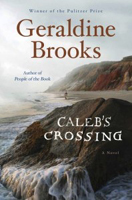 |
Caleb's Crossing Geraldine Brooks HarperCollins 2011 |
From the publisher's page:
In 1665, a young man from Martha′s Vineyard became the first Native American to graduate from Harvard College. From the few facts that survive of his extraordinary life, Geraldine Brooks creates a luminous tale of love and faith, magic and adventure.
When Bethia Mayfield, a spirited twelve-year-old living in the rigid confines of an English Puritan settlement - and the daughter of a Calvinist minister - meets Caleb, the young son of a Wampanoag chieftain, the two forge a secret friendship that draws each into the alien world of the other.
As Bethia′s father feels called to convert the Wampanoag to his own strict faith, he awakens the wrath of the medicine men. Caleb becomes a prize in a contest between old ways and new, eventually taking his place at Harvard, studying Latin and Greek alongside the sons of the colonial elite.
Fighting for a voice in a society that requires her silence, Bethia becomes entangled in Caleb′s struggle to navigate the intellectual and cultural shoals that divide their two cultures.
Once again, Pulitzer Prize-winning novelist Geraldine Brooks brings to vivid life a shard of little-known history, and through Bethia and Caleb explores the intimate spaces of the human heart.
Reviews
Jane Smiley in "The New York Times": "Geraldine Brooks's new novel, Caleb's Crossing, her fourth in a decade, is a short and seemingly modest historical work -- no kings, no famous events -- told by an equally modest narrator who does not go on to become acquainted with, say, the infant Benjamin Franklin...In Caleb's Crossing, Brooks returns to the time period and some of the issues she explored in Year of Wonders, a novel that takes place in a 17th-century English town ravaged by the plague, told in the first person by a young servant girl. The setting of this new novel is, however, not an earthly hell but a version of paradise, fertile and beautiful...Caleb's Crossing could not be more enlightening and involving. Beautifully written from beginning to end, it reconfirms Geraldine Brooks's reputation as one of our most supple and insightful novelists."
Kirsten Tranter in "The Monthly": "Caleb's Crossing extends Geraldine Brooks's interest in the early history of the United States, first explored in her Pulitzer Prize-winning March, which is set during the Civil War. Here, she writes about the seventeenth-century Puritan settlements in colonial Cambridge and on the island of Martha's Vineyard, where she now lives...Brooks's chief desire seems to be to inform - to set before the reader a carefully researched historical picture. In these terms, Caleb's Crossing succeeds."
Sarah Johnson on the "Reading the Past" blog: "As always, Brooks treads the dividing line between literary and popular fiction with confidence. Her work is strongly plotted, full of twists and surprises: life-changing disappointments, sudden opportunities, unexpected crossroads. The language is as fresh and crisp as the salt-tinged air, and her characters are, for the most part, ripened to their fullest potential. The one exception is Caleb himself. We get to know his personality and mettle, but he is kept at a distance. There are times - fortunately rare - when he reads more as symbol than flesh and blood. "
Mark Rubbo of "Readings" bookshops: "Geraldine Brooks's great skill is taking small historical moments and writing them large, using them to create a bigger picture. In 1665, a young man became the first Native American to graduate from Harvard College. Very little is known about this man and so Brooks has created a life and world for him: Caleb...Brooks tackles big issues in this book and gives them a universality that is not confined to the period it covers. Among them are the issues of women's rights, conflict between cultures, affirmative action and the nature of god and religion. Big stuff, but Brooks does it through the telling of a fascinating and rich story."
Alan Cheuse in "The Chicago Tribune": "A gift for creating a certain kind of novel can sometimes become as much a liability as a joy when that gift makes for great success in the writer's career. Fortunately for readers Pulitzer-Prize winning novelist Geraldine Brooks seems to love writing historical fiction as much as her fans love to read it. She follows her splendidly engaging novel People of the Book with a new novel, this one set on Martha's Vineyard in the late Seventeenth-Century...I admired this novel a great deal, especially the way that Brooks turned her extensive research, of which she speaks in a five page Afterward, into an easefully conducted narrative."
Interviews
Stephen Romei in "The Australian"
John Purcell on the "Booktopia Blog"
Ramona Kaval on ABC Radio National's "The Book Show".
Other
YouTube book trailer:
